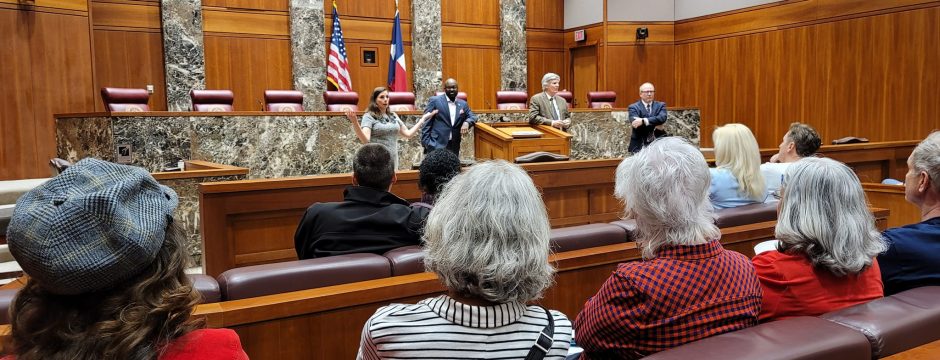
A commentary from Julie McCarty, CEO
We took a large group of activists to the Capitol this week to teach them more about engaging in government. Part of the training included a tour of the Supreme Court building. At one point someone asked a question to a group of judges about a decision made by the Court of Appeals that seemed wrong. The judges’ response was that it was an 8-1 decision, and they provided an explanation. Because the ones speaking are friendly to TTP and provided what seemed like a logical explanation, everyone smiled and nodded their heads, satisfied that, oh ok, all is well.
Ack! I wanted to scream. In fact, it took everything in me not to. And several times throughout the rest of the day I debated bringing it up. But I didn’t – and I regret that. Even the next morning I woke up still disturbed.
Do you see what was wrong with that picture? They took an elected person at his/her word on something their gut told them was wrong without hearing both sides. They relegated their decision-making to another. No!!! Don’t do that!
I don’t care how much you trust someone – you must use your own discernment, hear both sides, and make an educated decision. In this case, they need to read the dissenting opinion. I betchya they’d have agreed with the 1 dissenter and not the 8 in the majority, but even if they didn’t, it would have been their own, informed decision.
And that’s the 2nd part of my message. The issue at hand was the Court of Appeals saying that the TX Attorney General is part of the executive branch of government and not the judicial branch, and therefore has no judicial power to prosecute election fraud. They decided only the County DAs can do that. Everybody nodded and agreed, thinking, “Ah, yes. Separation of powers. That makes sense.” They immediately decided the majority opinion was correct.
What they did not stop to consider was the dissenting opinion, which explained that in Article 2 of the Texas Constitution under separation of powers it gives an exception: one branch cannot cross over to another branch except where expressly provided by the Constitution itself. So where in the Constitution does it allow crossover? Well, in the duties of the AG there’s one important phrase: “And perform such other duties as required by law.” Who creates law? The legislature. And the legislature in the Texas Election Code specifically states that the AG has the duty to prosecute election fraud. How much clearer can you get?
This is the simplest summary I can put together: The legislature gave the AG authority on election fraud, and the Constitution says the AG has the power given to him/her by the legislature even if it defies the separation of powers. This provision alone completely destroys the basis for the majority opinion of the court.
I appreciate Judge Kevin Yeary’s willingness to stand on his own in his dissent. If only Texans would take the time to read it! But please hear me… I give this story just as an example. I’m not at all saying we should be against the other 8 or want them to be replaced. They aren’t going to get everything right all the time. My goal is always for citizens to educate themselves and come to their own conclusions.
As for those on our tour – no worries. They are actively engaged with True Texas Project, and that means they are getting that education needed to make those wise decisions and hold elected persons accountable. The group is already heads and tails beyond the average voter! You can be too!
